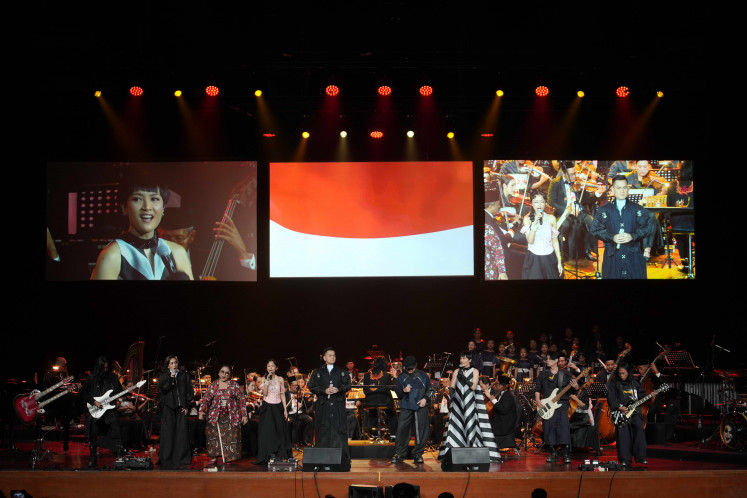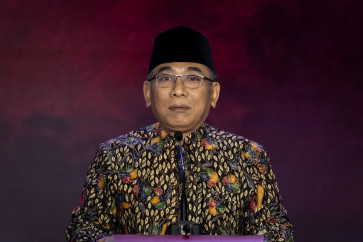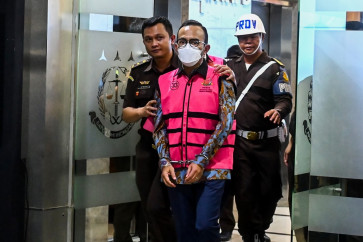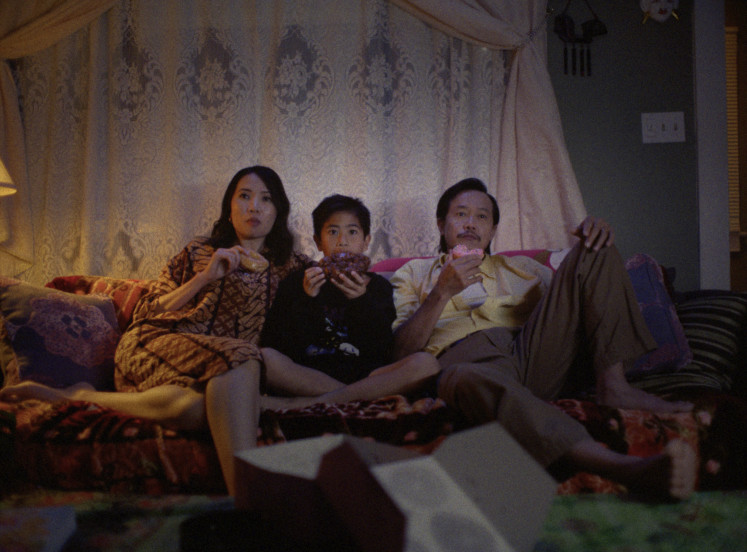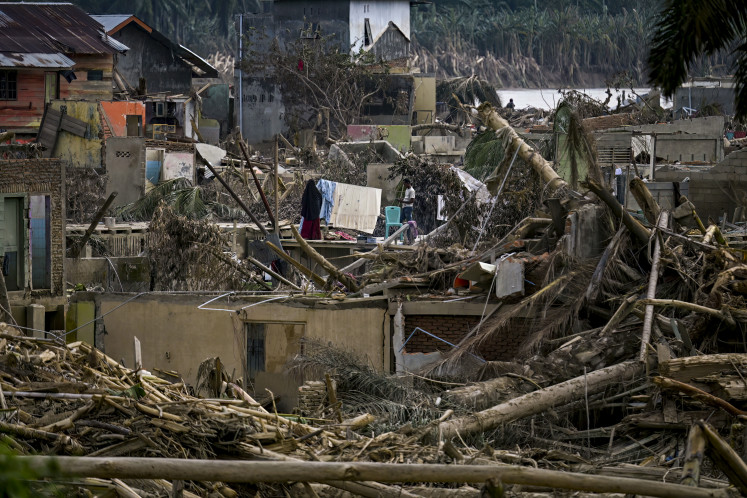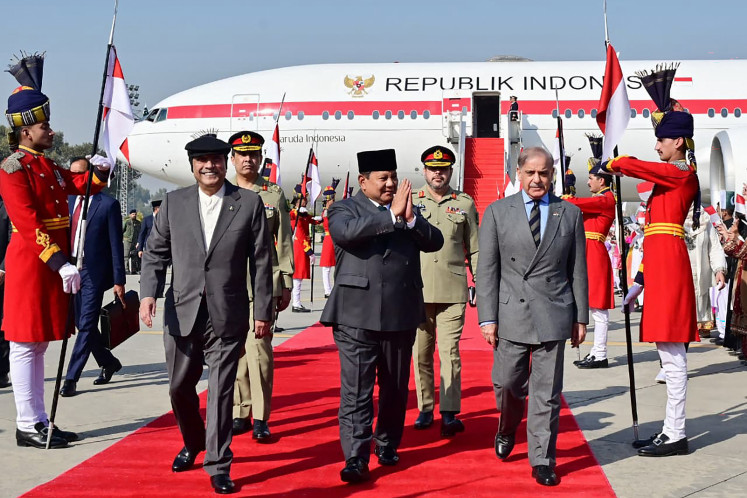Popular Reads
Top Results
Can't find what you're looking for?
View all search resultsPopular Reads
Top Results
Can't find what you're looking for?
View all search results12 Indonesian books you should add to your reading list
Change text size
Gift Premium Articles
to Anyone
T
o celebrate National Book Day, which falls on May 17, here’s our picks of Indonesian books (also available in English) that you should add to your reading list—if you haven't already.
Before Dawn: The Poetry of Sapardi Djoko Damono (2005)
Author: Sapardi Djoko Damono
Translated by John H. McGlynn, this book contains poetry written by Sapardi Djoko Damono, one of Indonesia’s most renowned poets. It contains 30 more poems than Before Dawn – Suddenly the Night, which was released in 1987.
Some of the most popular poems in the 2005's book are Rain of June and I Want, with the latter being commonly quoted by and even put to music by fans.
Man Tiger (Lelaki Harimau) (2004)
Author: Eka Kurniawan
The book, which recently named a nominee for the prestigious Man Booker International Prize, follows Margio, a youngster from a rural area in Indonesia, who decides to kill a man. This leaves the whole village confused as Margio doesn’t seem like a person who could actually harm anyone. The worst crime he has ever committed is stealing a chicken, which was regarded as something that “happened out of spite”.
(Read also: Eka launches new novel after entering Man Booker list)
But, Margio really did kill the man, moreover in a brutal way. When asked why he did it, he answered, “It wasn’t me. There’s a tiger in me”.
The Land of Five Towers (Negeri 5 Menara) (2009)
Author: Fuadi
Alif was a country boy from Maninjau in Padang, West Sumatra. Even though he dreamed to be another BJ Habibie, the country's former president, circumstances led him to enroll at Pondok Madani, an Islamic boarding school in East Java.
Although disappointed at first, he learns the words man jadda wa jadda during his time there, which translates into “He who works hard must be successful” in Arabic, and later finds his life changed because of it.
Winter Dreams (2011)
Author: Maggie Tiojakin
Nicky F. Rompa went to Boston, Massachusetts, to have a new life. During his stay, his new family, lover and his boss—apparently everyone around him—teaches him new lessons about living in a multicultural society.
Not only does he have to learn more about himself through it, he also embarks on a journey that will last throughout his life.
An Anthology of Feelings (Antologi Rasa) (2011)
Author: Ika Natassa
In the setting of a modern city life, Keara, Ruly and Harris are friends. What differentiates them from being just friends are the feelings they have for each other as well as the fact that they have to see the one they love loving another person.
9 Summers 10 Autumns (2011)
Author: Iwan Setyawan
From the Apple Town of Indonesia to the Big Apple. With great effort and education, a country boy from Malang, East Java, manages to climb his way up to New York, US.
(Read also: Here's what to read in your feminist book club)
Although he is finally able to lead a better life, it didn’t erase the struggle and pain within him. At one point, he looks back on his life, looking for the love his family has always had for him—the thing that eventually saves him.
The Rainbow Troops: A Novel (Laskar Pelangi) (2005)
Author: Andrea Hirata
Ikal and his friends, the Rainbow Troops, are children of Belitung, an island off the Sumatran shore. Being in the poorest social class, they struggle to receive a proper education.
Even when their school is on the verge of closing, they don’t give up and, at an event, prove to everyone that they are no less talented than the students from PN, the school of the wealthy people of the land.
This Earth of Mankind (Bumi Manusia) (1980)
Author: Pramoedya Ananta Toer (1980)
The story takes place at the end of the Dutch colonial era in Indonesia. Minke is a Javanese minor royal who is able to attend Hoeger Burger School. He is a talented writer, but hated by many for simply being a ‘native’.
One day, he meets Nyai Ontosoroh, the concubine to Dutchman Herman Mellema. He then falls in love with Annelies, the couple's daughter, and eventually marries her in an Islamic wedding. However, this marriage is unacceptable in the eyes of Dutch law because it was carried out without the consent of Annelies’ legal guardian.
Max Havelaar (1860)
Author: Multatuli
Edward Douwes Dekker, a worker of the Dutch East Indies who lived in Indonesia during the Dutch colonial period, wrote a book to protest colonialism under the name of Multatuli.
(Read also: 6 book-to-movie adaptations to watch this year)
In the book, he creates a character named Batavus Droogstoppel, a stingy coffee merchant who symbolizes the Dutch colonials and how they treated Indonesian people at the time.
Sitti Nurbaya: A Love Unrealized (Sitti Nurbaya: Kasih Tak Sampai) (1922)
Author: Marah Roesli
Written in 1922, Sitti Nurbaya explores themes of colonialism and forced marriage that was a common practice during that time. The story revolves around Sitti Nurbaya and Samsulbahri, two childhood friends who love each other but are separated because circumstances force Sitti into marrying Datuk Meringgih, a rich but shady trader.
Sitti is eventually killed by Datuk. Years later, when Datuk protests against the Dutch, Samsu who works as a Dutch soldier, kills him and later dies as well. The story is often said as having a similar pattern with Romeo and Juliet or Butterfly Lovers.
Harimau! Harimau! (1975)
Author: Mochtar Lubis
Seven dammar collectors venture into the forests of Sumatra, led by a dukun (traditional spiritual leader) named Wak Katok. Inside the forest, they are ambushed by a tiger. All but one of them is killed. The remaining survivor decides to hunt the tiger to make it out from the forest, which leads them to discover the faults of Wak.
This story is described as a symbol of protest by the author against the Indonesian people whom he regard as blindly following the first Indonesian president, Sukarno.
Anxiety Myths (Mitos-mitos Kecemasan) (1985)
Author: Afrizal Malna
Anxiety Myths contains poetry by Afrizal Malna, a poet as well as theatrical text writer whose works have been used in Indonesia and other countries.
He mostly uses the themes of modern, urban city life and everything that it entails. He also connects objects in his work, creating a distinct writing style. (kes)


